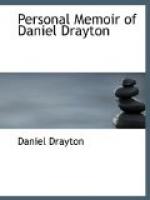taking upon themselves the character of a meeting
of citizens, appointed a committee to wait upon Dr.
Bailey, to require him to remove his press out of
the District of Columbia. Of course, as I was
locked up in the jail, trying to rest my aching head
and weary limbs, with a stone floor for a bed and
a water-can for my pillow, I can have no personal
knowledge of what transpired on this occasion.
But a correspondent of the New York Tribune,
who probably was an eye-witness, gives the following
account of the interview between the committee and
Dr. Bailey:
Clearing his throat, the leader
of the committee
stretched forth his hand,
and thus addressed Dr. Bailey:
Mr. Radcliff.—Sir, we have been appointed as a committee to wait upon you, by the meeting of the citizens of Washington which has assembled this evening to take into consideration the circumstances connected with the late outrage upon our property, and to convey to you the result of the deliberations of that meeting. You are aware of the excitement which now prevails. It has assumed a most threatening aspect. This community is satisfied that the existence of your press among us is endangering the public peace, and they are convinced that the public interests demand its removal. We have therefore waited upon you for the purpose of inquiring whether you are prepared to remove your press by ten o’clock to-morrow morning; and we beseech you, as you value the peace of this District, to accede to our request. [Loud shouting heard at the Patent Office.]
Dr. Bailey.—Gentlemen: I do not believe you are actuated by any unkind feelings towards me personally; but you must be aware that you are demanding of me the surrender of a great constitutional right,—a right which I have used, but not abused,—in the preservation of which you are as deeply interested as I am. How can you ask me to abandon it, and thus become a party to my own degradation?
Mr. Radcliff.—We subscribe to all that you say. But you see the popular excitement. The consequences of your refusal are inevitable. Now, if you can avert these consequences by submitting to what the people request, although unreasonable, is it not your duty, as a good citizen, to submit? It is on account of the community we come here, obeying the popular feeling which you hear expressed in the distance, and which cannot be calmed, and, but for the course we have adopted, would at this moment be manifested in the destruction of your office. But they have consented to wait till they hear our report. We trust, then, that, as a good citizen, you will respond favorably to the wish of the people.
Another of the Committee.—As one of the oldest citizens, I do assure you that it is in all kindness we make this request. We come here to tell you that we cannot arrest violence in any other way than by your allowing




